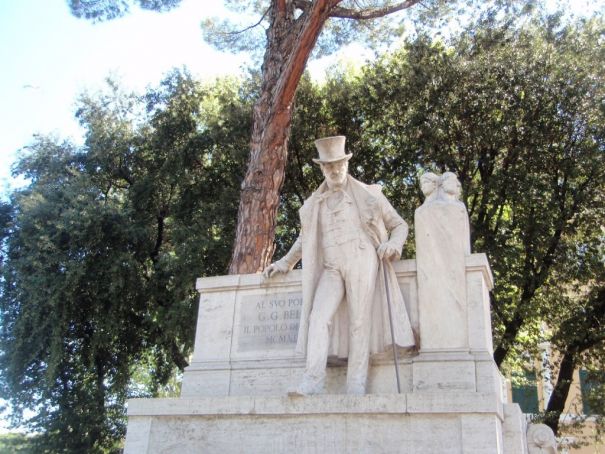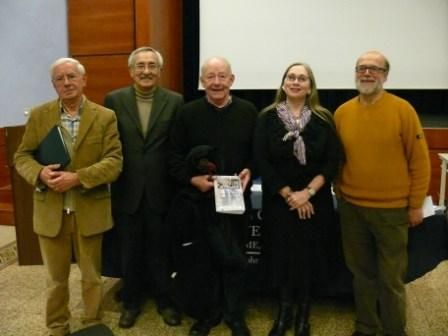Belli's Romanesco sonnets are given new life in colloquial English.
Andy Devane
Residents of Rome will be familiar with the white marble statue of Giuseppe Gioachino Belli that stands at the Ponte Garibaldi end of Viale Trastevere. With his cape, his cane and his top hat, it is as if the poet still observes the descendants of the people he recorded in his satirical sonnets.
Born in Rome in 1791, Belli began writing sonnets in Italian at an early age, on the suggestion of his lifelong friend, the poet Francesco Spada. However he discovered his true passion in his mid-twenties when he switched to romanesco, the vernacular of Rome’s salt-of-the-earth citizens. Belli set about documenting the extra-curricular pursuits of working class Romans with a fervour that resulted in a staggering legacy of 2,279 sonnets, most of which veer between the indecent and downright obscene. His was an irreverent city populated by pimps, prostitutes and prelates. The fact that Belli’s Roman sonnets survived at all is a miracle, as just before his death in 1863 the poet requested they be burnt. Thankfully his dying wishes were ignored and, almost 150 years after his sonnets were saved from the flames, scholar Michael Sullivan has translated 323 of them into a unique form of English.
An Englishman of Irish descent, Sullivan dips into the British Isles’ deep colloquial pool, relocating Belli’s human comedy to a world where Cockney is spliced with Glaswegian, Belfast meets Brummie, a bawdy Dublin encounters a no-nonsense Yorkshire. Among the unexpected contemporary personalities he refers to in the translations are Houdini, Gucci and Sharon Stone, while those familiar with London will recognise references to the Bailey, Number Ten, the Palladium and kew. Irish references include shillelaghs and “eejit” (idiot), and even transport gets refreshed: a carrozza becomes a “Rolls- Royce”.

In the past others have tried their hands at translating Belli’s sonnets into English, notably Anthony Burgess whose 1977 novel Abba Abba – which includes a fictional Roman meeting between Belli and Keats – features 79 translated sonnets. Burgess was inspired while living in a third floor apartment in Piazza S. Cecilia, a few side-streets away from Belli’s monument, in the early 1970s. Others who have tackled Belli include Cheshire’s Mike Stocks, who published 60 sonnets in 2007. Stocks began the task after discovering the work of Edinburgh poet Robert Garioch who translated 220 of Belli’s sonnets into Scots dialect. The Scotsman learnt his Italian the hard way: while serving with the British army in libya in 1942 he was captured by German troops and spent the next three years as a prisoner of war in camps in Italy, Africa, Austria and Germany.
In the 1950s American beat poet Harold Norse had more fun translating Belli’s works, “with a dictionary in one hand and a Roman in the other.” Sullivan argues that previous translators took freedoms with Belli’s strict rhyming scheme, overcoming obstacles by employing enjambement (the breaking of a syntactic unit by the end of a line or between two verses). He believes the help that some received with deciphering romanesco was “sometimes inadequate” and that “Burgess can altogether mistake and invert a meaning.”
Sullivan said: “The sonnet chosen had first to seem a good poem, then to interest by its content or its technical solutions, and not be too determined by local or contemporary reference as to make it difficult to grasp without a note. I did not want to cover too much ground already tilled by Norse, Burgess, Garioch, Stocks and others – with Garioch, previously the most prolific translator with 220 sonnets, I share only 28. This means that there is much more of Belli available in English than one might imagine.” Although difficult to source a sonnet that wouldn’t risk offending the more sensitive reader, below see Belli’s Er bottegaro with Sullivan’s version titled The shopkeeper. Its subject is topical, given Italian premier Mario Monti’s push for the liberalisation of various forms of licensing, but note that Sullivan updates Belli’s reference to seeking permission for opening shop from ecclesiastical to municipal sources.
Er bottegaro Chi un bùscio de bbottega cqua vvò uprí prima de tutto je bbisoggna annà da Monziggnor Governatore, e llà aspettà un anno che jje dichi: Sí. Finarmente opri; e ecchete de cqua Monziggnor de la Grasscia pe ssentí si cciài liscenza, e cquanno, e ccome, e cchi: e, vvisto tutto, te la fa sserrà. Rimedi st’antra: e ecchete de sú er Cardinal Vicario pe vvedé si cc' ègente che offenni er bon Gesú. Quann'è ppoi tutt’in regola, ch'edè? scappa un editto; e ssenza ditte ppiú te se maggneno er buscio e cquer che cc'è.
The shopkeeper If yer wanna open a shop these days, afore evythin’ else, away yer goes the Town ‘All registry, an’ then ‘oo knows yer wait a year an’ yer gets the Ok. Yer gets open at last an’ then in blows Fire an’ ‘Ealth inspector to ‘ave ‘is say, where’s yer license, dated when, ‘oo, wot way, an’ when everything’s checked, they makes yer close. Yer deal wiv that as well: then on yer back comes some VAT inspector wot’s hot to know ye’re not workin’ in the black, yer shows everything’s straight: an’ nah wot? they brings in a new law an’ snicker-snack they gobbles up the shop an’ all ye’ve got.

While Belli was often gloriously vulgar in his sonnets, outwardly he lived a politically-conservative existence. This ironic double life saw him employed as a censor for the papal government, where he was responsible for banning works by, among others, Verdi, Rossini and Shakespeare. It is curious to imagine how Belli would react if he knew that English versions of his work recently received applause from an audience at Trastevere’s John Cabot University or indeed that Sullivan, along with fellow associates of Rome’s Centro Studi Belli, read the poet’s sonnets from he hallowed stage of the Accademia Nazionale di S. Luca.
This article was published in the March 2012 edition of Wanted in Rome magazine.





















